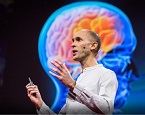Anil Seth
Professor Anil Seth, University of Sussex, UK
Real problems and beast machines: predictive processing and conscious experience
10:20 - 11:20, Monday 12th April
Biography
 Anil is a Professor of Cognitive and Computational Neuroscience at the University of Sussex, where he is also the Co-Director of the Sackler Centre for Consciousness Science. Anil is also a Wellcome Trust Engagement Fellow, Co-Director of the Canadian Institute for Advanced Research (CIFAR) Program on Brain, Mind, and Consciousness, and Co-Director of the Leverhulme Doctoral Scholarship Programme: From Sensation and Perception to Awareness.
Anil is a Professor of Cognitive and Computational Neuroscience at the University of Sussex, where he is also the Co-Director of the Sackler Centre for Consciousness Science. Anil is also a Wellcome Trust Engagement Fellow, Co-Director of the Canadian Institute for Advanced Research (CIFAR) Program on Brain, Mind, and Consciousness, and Co-Director of the Leverhulme Doctoral Scholarship Programme: From Sensation and Perception to Awareness.
Anil is an Editor-in-Chief of Neuroscience of Consciousness (Oxford University Press), was Conference Chair of the 16th Meeting of the Association for the Scientific Study of Consciousness (ASSC16, 2012), and sits on the steering group and advisory board of the Human Mind Project. Since 2014 they have been a member 'at large' for the ASSC. Anil was the 2017 President of the British Science Association (Psychology Section).
Anil edited and co-authored the best-selling 30 Second Brain (Ivy Press, 2014), was consultant for Eye Benders (Ivy Press, 2013; winner of the Royal Society Young People’s Book Prize 2014) and contributes to a variety of media including the New Scientist, The Guardian, and the BBC. Anil also writes the blog NeuroBanter.
Abstract
Consciousness is, for each of us, the presence of subjective experience. Without consciousness there is no world, no self: there is nothing at all. In this talk, I will illustrate how the framework of predictive processing (or active inference) can help bridge from mechanism to phenomenology in the science of consciousness. I will advance the view that predictive processing, precisely because it is not itself a theory of consciousness, is an excellent theoretical resource for consciousness science. I will illustrate this view first by showing how conscious experiences of the world around us can be understood in terms of perceptual predictions, drawing on examples from psychophysics and virtual reality. Then, turning the lens inwards, we will see how the experience of being an embodied self rests on control-oriented predictive (allostatic) regulation of the interior of the body. This approach implies a deep connection between mind and life, and provides a new way to understand the subjective nature of consciousness as emerging from systems that care intrinsically about their own existence. Contrary to the old doctrine of Descartes, we are conscious because we are beast machines.
